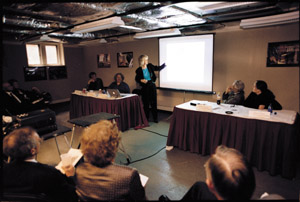Chicago:
Campus of the Big Ideas
>> The
launch of The Chicago Initiative-the University's five-year, $2
billion fund-raising effort-was marked by an April 12 event that
focused on Chicago's intellectual initiatives.
|
9
|
In
the realm of the senses: how do we understand what we see,
hear, feel, smell, and taste? |
The
goal, said James Chandler, AM'72, PhD'78, the Barbara E. &
Richard J. Franke professor in English and director of Chicago's
Franke Institute for the Humanities, was to "try to make
sense of the senses." To that end, four scholars tackled
sound, smell, touch, and sight. (Taste, Chandler joked, would
have to wait for the post-symposia reception.)
|
|
|
Martha McClintock discusses chemosignals and pheromones:
smell.
|
We
are what we sense, suggested William Wimsatt, professor in philosophy.
Or are we? In the 1974 paper, "What Is It Like to Be a Bat?",
philosopher Thomas Nagel argued that a bat's conscious experience-a
world perceived through echoes of high-frequency sound signals-is
so different from the conscious experience of humans that we can
never fully imagine it. Yet, Wimsatt noted, human technology and
instrumentation "is very productively seen as an extension
of our senses," allowing us to experience the world in ways
that our physiology doesn't-in ways, for example, that mimic a
bat's sense of things.
Are
we culturally biased against certain senses? Take smell. "I
want to champion the causes of odor and communication," said
Martha McClintock, the David Lee Shillinglaw distinguished service
professor in psychology and director of the Institute for Mind
and Biology. In her research on chemosignals and pheromones, McClintock
said, she has tried to show how smell can "influence humans
positively." Most recently her team has demonstrated that
women prefer the odor of males to whom they are genetically similar-but
not identical-over those who are either nearly identical or completely
unfamiliar, work that may help explain how certain genes influence
mating choice.
Moving
from 21st-century experiments to 19th-century medical history,
Alison Winter, AB'87, associate professor in history, began with
a paradox: although nitrous oxide or "laughing gas"
was well known by the 1790s it wasn't until the mid-1840s that
the anesthesia began to be widely used to blunt the pain of the
surgeon's knife. Winter's tale of mesmerists and medicine argued
that anesthesia's adoption "was not a medical watershed as
much as a sea change in sensibility," the result of a change
in how humans felt about pain, "a different set of expectations
of what the senses could do and what we could do to the senses."
A
changing perception of the power of the senses was also the theme
limned by Tom Gunning, professor in art history and the Committee
on Cinema & Media Studies. The infancy of American cinema,
he said, coincided with a "deep-rooted suspicion of the visual
senses," a suspicion that prompted a 1915 Supreme Court censorship
ruling to inveigh against film as "capable of evil,"
especially where "susceptible publics"-women, children,
and the poor-were concerned. The Supreme Court's argument, Gunning
noted, implied that the new medium was exempt from the First Amendment
because it was more powerful than print and "the visual
might somehow overwhelm the verbal."
That
story from moving-picture days may seem quaint, but Gunning pointed
to a contemporary moral, arguing that "training the senses,
realizing their unique forms of knowledge," remains an important
task in the 21st century.
-M.R.Y.
1.
In
the beginning: what do our origins tell us about ourselves?
2.
Homo sapiens: are
we really rational creatures?
3.
Integrating the
physical and biological sciences: what lies ahead?
4.
Money,
services, or laws: how do we improve lives?
5.
Clones, genes, and
stem cells: can we find the path to the greatest good?
6.
How will technology change
the way we work and live?
7.
Why do we dig up
the past?
8.
Art for art's sake?
9.
In the realm of
the senses: how do we understand what we see, hear, feel, smell,
and taste?
10.
Can we protect
civil liberties in wartime?
CHICAGO
INITIATIVE GOALS


![]()
